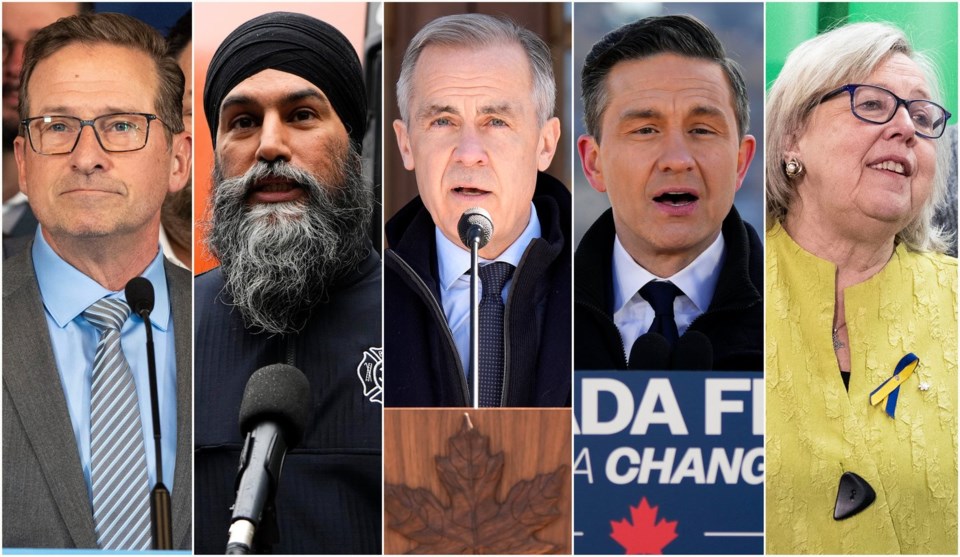OTTAWA — Conservative Leader Pierre Poilievre is promising to tighten financial transparency rules for elected officials — and is using that promise to take aim at Liberal Leader Mark Carney.
Poilievre told a press conference in Ottawa on Sunday that if his party forms government, he'll ban what he calls "shadow lobbying."
"We will eliminate the lobbying loophole and require anyone who is acting as an adviser to government officials to declare themselves and register as a lobbyist, whenever they are advising on matters that touch upon their financial interests or that of their company," Poilievre said.
He said this rule would have forced Carney to register as a lobbyist when he advised former prime minister Justin Trudeau through the Liberal party.
The Conservative leader also said he would require that cabinet ministers "divest fully from tax havens" and disclose their assets — more shots at Carney, who has come in for scrutiny for not disclosing his financial assets and because his former firm Brookfield Asset Management registered entities in the Cayman Islands tax haven.
Poilievre billed his package of measures as the "Accountability Act 2.0" — a reference to a law passed by the former Stephen Harper government. It ushered in modern parliamentary ethics rules and created the offices of the lobbying and ethics commissioners.
Carney has said in the past that he has put his assets in a blind trust and was in discussions with the ethics commissioner about creating a conflict of interest screen.
But his ethics disclosure filing may not come out until after the election — and Carney has not said anything about what went into the blind trust.
Poilievre also accused the Liberal leader of "hiding from the public" by not taking questions for several days, and of refusing to tell Canadians more about his investments.
The Liberals have sought to cast Poilievre in a similar light. They sent out a fundraising pitch to their supporters Sunday noting that Poilievre limits media access by, for example, limiting the number of questions he takes to four a day.
Liberal party spokesperson Mohammad Hussain also said that "if anyone is hiding and trying to duck accountability from the media, it is Pierre Poilievre."
When asked by reporters whether Carney's decision to step back from the campaign matters, since it doesn't seem to have done him any political harm, Poilievre replied, "That's a choice Canadians will have to make."
Carney’s national tour was on a break ahead of a crucial week in the election. That's not unusual in a campaign but Carney also notably declined to take questions from reporters in Parliament on Friday after a cabinet committee meeting.
Carney and Poilievre appeared on the popular Quebec talk show "Tout le monde en parle" Sunday evening. The party leaders spoke about several topics including U.S. tariffs and Canada's economy.
The influential Radio-Canada show regularly gets nearly a million viewers a week and is considered a crucial way for federal party leaders to introduce themselves to Quebec.
Carney's ability to speak French has been under scrutiny since he struggled during the French-language debate in the Liberal leadership race.
Carney will face a more daunting task in Wednesday's French language election debate. He'll be facing off against Poilievre and Bloc Québécois Leader Yves-François Blanchet — both skilled French-language debaters who will be on the lookout for gaffes and missteps.
NDP Leader Jagmeet Singh, meanwhile, took his campaign to Timmins, Ont., on Sunday, where he talked about his plan for northern Ontario.
The party says it wants to boost the number of doctors in the region through local training and "fair wages." It's also promising to address high grocery prices and repair ailing infrastructure in the region.
The Liberals are fielding former Timmins mayor and municipal councillor Steve Black in the riding. He's running against the NDP's Nicole Fortier Levesque, former mayor of Moonbeam, Ont.
Singh is down two very prominent northern Ontario NDP incumbents in this election. Charlie Angus, a longtime MP from the region, is not running again.
Party stalwart Carol Hughes is also leaving federal politics after her riding of Algoma-Manitoulin-Kapuskasing was removed from the political map through redistricting and divided among surrounding districts.
Hughes was among the figures flanking Singh at his morning press conference, where he used those two former MPs as examples of strong NDP voices northerners have sent to Parliament in the past.
Singh also said the other major party leaders have failed to substantively address Indigenous issues in this election.
"I challenge the other parties to make Indigenous issues a fundamental and important issue in this campaign," he said.
This report by The Canadian Press was first published April 13, 2025.
— With files from Sarah Ritchie
Kyle Duggan, The Canadian Press


